|
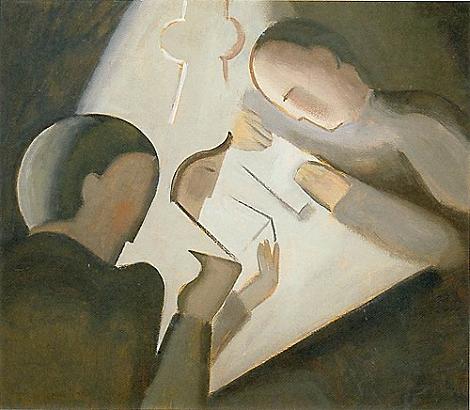
Readers under the Lamp
Willi Baumeister
1913
WEIMAR
_______________________
Suns on a Stone
Ashur Etwebi
translated from Arabic by Samira Hassan ben Ammou & Pierre Joris
Nomadics
(....)
five suns on one stone, five roads that lead to her heart, five wings for
the kite, five ladders to the house of the Lady, five spices for his
Excellency the cook, five seasons for the lazy gardner.
only one reverence for earth, one heart-break for the sky
nothing for me, nothing for you.
for us two
alone.
________________________
in front of the camera life flows tirelessly
the darkness behind the women
and the eloquent silence
below Them someone dead
and the remains of cooked veal
above Them a heaven
opening the door of its bedroom
and warm and lavish sweat, flowing from the eyes of a wingless white/black bird
Between their hands a ring and a sieve
a large and curved elephant’s tusk
a cold body and a river without pulse
a stale loaf of break and sad mutterings
...(more)
_______________________
I want to rock your gypsy soul
Just like way back in the days of old
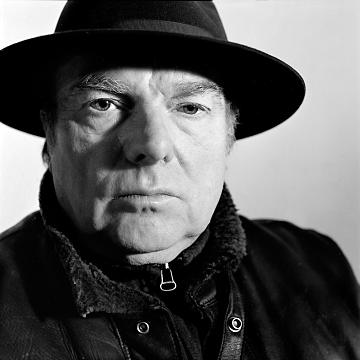
Van Morrison
b. August 31, 1945
Too complicated, too complicated
You know this crazy scene
Too complicated, too complicated
No one says what they mean
Are you telling me that everything's fine
When I can't even tie my shoes
Better get into a new frame of mind
When I don't have to think about the business no more
`Cause I just wanna blow my horn.
Van Morrison, So Complicated, Hymns To the Silence
_______________________

H. G. Wells, London
1939
Wolfgang Suschitzky
b. August, 29 1912
_______________________
The Changing Nature of Books and the Uneasy Case for Copyright
Niva Elkin-Koren
The rise of digital books may require a reexamination of the legal policies that regulate the book market, primarily copyright and competition law. This Article questions the wisdom and legitimacy of granting copyright to publishers as the book market enters the digital age. Part I describes the emergence of eBooks and the changing nature of book publishing in the twenty-first century. It discusses the special characteristics of digital books, the rise of user-generated content (“UGC”), and the introduction of new intermediaries. Part II revisits the justification for copyright protection in light of these changes, and discusses the implications of these changes on copyright. Copyright law, the legal regime mostly tied to the emergence of the printing press, may now come into question. With the rise of eBooks, the role of publishers is declining, and consequently the case for granting copyrights to publishers is weakening. New business models of online intermediaries, which facilitate eBook publishing, do not necessarily rely on copyright protection. The Article further examines how copyright law structures the market for eBooks and shapes relationships among the different players.
_______________________

Willi Baumeister
(January 22, 1889 – August 31, 1955)
photo - Hannes Kilian
1947
_______________________
The Collagist
Issue Twenty-Five
August 2011
Dzanc Books
_______________________
Flashes (After Reverdy)
Carlota Caulfield
Translated by Mary G. Berg & Carlota Caulfield
(....)
Faces
Against the camera’s digital image, the eye confused. The abyss in a flick of the retina. Focusing, a child’s play, is a difficult task. A familiar face merges with the face of a passerby, and again and again, until the numbers fade. One thinks of something else, in that other someone, and forgets to click. The story of her life. Always. She is there — The photos not taken remain.
Magritte and his pipe
There’s no dense cloud or voice rising to the ceiling in a smoke ring — sanctity of the image. What is not may possibly be and watch out for your fingers. Once again the match with a mocking tip. Silence. And the tobacco is extinguished, the aroma lingers, and the air is just a waterfall of dreams.
...(more)
Cerise Press Vol. 3 Issue 7
a journal of literature, arts & culture
_______________________
from Galįxias
Haroldo de Campos
translated from Portuguese by a.s. bessa
'rounded by flowers under god's under the devil's mercy god shall guide you for I myself can't guide godbless those who give me 'rounded by flowers and those who are still to give sounding like a shamisen made of a tensed wire a stick and an old tin can at the end of the partyfair at highnoonhigh but for many that music did not exist it could not because it could not popplay if not sung that music is not popular if not in tune it does not atone nor tarantina and yet struck in the gut of misery in the tensed gut of the meagerest physical misery aching aching like a nail in the handpalm a rusty blind nail in the palm clasping palm of the handheart exposed as a tensed nerve retensed a renigrated blind nail everlasting in the palmpulp of the hand in the sun while selling for meager cruzeiros gourds in which the good form is fine meagerness of matter morphing famineform of halfbaked clay in the rottenroot of distress until others vomit their plastic plates of embroidered borders empirestyle for mistress misery for this is popular for the patrons of the people but people create and people engender and people wonder people are the languageinventor in the malice of the mastery in the smartness of marveling in the vein to improvise stuttertrying...(more)
Ethnopoetics - Poems
curated by Jerome Rothenberg ubuweb
_______________________

august's end
photo - mw
_______________________
The Great Outdoors
Rob Budde
and what is found there, your own
threshold holding onto the architecture,
leaving the frame inflected with fear
and here you are—the meaningless
fields and where they end, endless
metaphors for feeling green
—envy, I suppose; a hope grows
that the land would have us back
until then, the scene is set
plastic molds whole ranges
cupped into mouths—the hunting
rambler, a beautiful trophy,
a small consolation
in a sad artful epidemic
Dusie 10: the Canadian issue
June, 2010

From the Closet of the Past
(Women with fan & feather on face)
1957
Clarence John Laughlin
1905 - 1985
1 2
_______________________
The Shadow Of His Equipage
Jonathan Williams on Clarence John Laughlin
The Jargon Society
Writing notes for this essay, I thought: I will now command a pellucid American idiom. I will write about Clarence John Laughlin with the startling clarity of a certain ice-water spring I know on the flanks of Mt. Le Conte in the Great Smoky Mountains. But, it can’t be done. Clarence is all phantasmagoria and gumbo—Archimboldo, The Invasion of the Body Snatchers, Grandville, Belle Grove Plantation, the Wizard of Oz, and skillet cornbread. Bizarrerie is what you’re having for dinner. Be my guest; eat what you like and leave the rest for Genius Loci.
(...)
He is the Master of Ignored Ghastliness, of the Eldritch, the Psychopompous, the Metamorphic, the Mephitic, the Fearsome, and now and then of Trumpery and the Fulsome. Purists and the mean in spirit have regarded him with disdain for almost forty years and have ignored him as being in the same league as Carmen Cavallero, “The Poet of the Piano.” Well, if you’re going to put titles like “Starlight in Steel” and “And Tell of Time... Cobwebbed Time” and “The Vials of Wrath Have Opened,” then you’re going to have trouble. No matter....(more)
_______________________
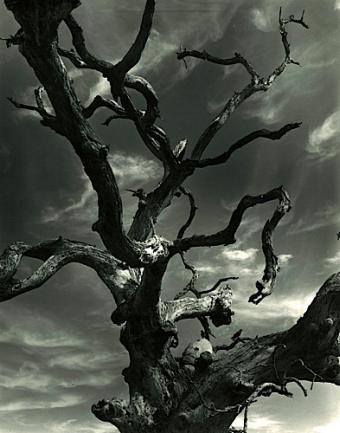
The Unending Tree
Clarence John Laughlin
1953
_______________________
Do Not Bring a Tree into the House
Dennis DiClaudio
exquisite corpse
Yes, Hypatia was dragged from her carriage and pulled into the Caesareum. She was stripped naked. She was flayed with sharpened tiles and beaten and killed. Yes. Her body was carved into pieces and then burnt on a pyre in the Cinaron. It was a painful and cruel death, yes, but do not bring a tree into the house.
Trees belong outside, where their roots can grow downward into the earth, where their limbs can reach upward toward the sky, where birds can make their nests in their branches and wearied travelers can rest beneath the shade of their leaves. And though it was a party of Nitrian monks, good Christians, who sharpened their ostrakois against rocks and waited for Hypatia's carriage to pass, we cannot help but view this event with some concern. Is it too much to assume that there was screaming, angry death cries and doleful wails? Is it too much to ask that you not bring a tree into the house?
(....)
I know. I know what you're thinking. You're thinking that Hypatia would don her philosopher's robe and walk the streets of Alexandria, interpreting the lessons of Plato and Aristotle for the citizens. And now there is a squirrel scurrying across the top of the bookshelf. We will not be able to get it down without the use of some very long stick, like, perhaps, a broom handle, like, perhaps, Hypatia beguiling Orestes, the prefect of Alexandria, through her magic and turning him against the Nitrians and against the teachings of Christ so that he would no longer take Holy Communion. How she forced him, through demonic possession, to publicly subjugate Hierax for his knowledge of the holy doctrine. How the branches of this tree stretch into the dining room and the study and scrape the newly painted pantries in the kitchen.
The house is no place for a tree. Look. I've written it down and posted it on the refrigerator where you can see it every morning, so you won't forget. And John, Bishop of Nikiu, you have written the history of this incident in ink with the seal of the church, so it is official in the eyes of God.
_______________________
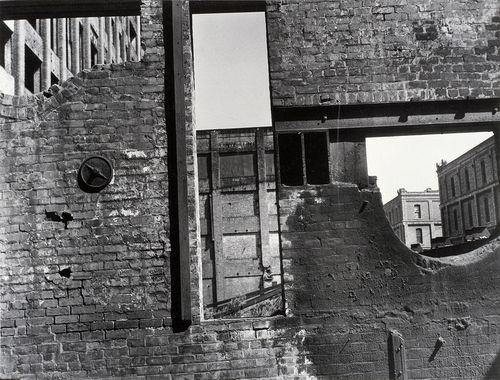
Three Vistas through One Wall
Clarence John Laughlin
1937
_______________________
The Human and his Spectacular Autumn, or, Informatics after Philosophy
Anustup Basu
pmc
(....)We are, in a general way, already talking about fascism and the strange existential predicament of the individual grappling with it. This, despite the fact that the individual in this case may either be the Fuhrer himself, or the enlightened philosopher trying to understand this modality of power through a meaningful reading of the world. Both Garcķa Mįrquez's patriarch, who thinks he "holds" power and the primordial Heideggerian thinker--whose inventory of tasks include avoiding this or that ensnarement of being as subject, staying away from the herd, and thinking about Being--are seen to be already inducted into an overall mass-technological production of "they-selves." In bringing these two figures together in a constellation of thought, we are trying to understand a historical turn in Western industrial societies when the autumn of the patriarch (who may or may not have an enlightened head on his shoulders, but who always "holds" the scepter of power with a despotic sway) also proves to be the twilight of the disinterested philosopher. These figures "represent" two important aspects of the historical agency of the Western subject of enlightenment. As we know, Kantian modernity was founded on these two agents and their respective executive-juridical and moral-legislative authorities as caretakers of the political state and the ethical one] It was this secular compact between power and knowledge in the body politic that created the epistemological figure of the European human who presumed to make history exactly the way he liked it. While the Heideggerian project was to announce the end of that philosophy of progress and deconstruct the transcendental subject that it proposed as the free-willed agent of history, it also entailed an atavistic and agrarian denial of industrial modernity.
(...)
The search for another form of politics has to begin with a critique of the aphasic, self-conscious navel-gazing of the North Atlantic intellectual, who approaches a state of stupefied entropy on looking at a monstrous military-informatic-financial assemblage which has reduced the great modernist projects of culture and ideology to incidental arrangements that can be only locally applied. To restrict an understanding of the political that is emergent to a set of cognitive phenomenological tasks of the human subject, who, as Foucault points out, is an empirico-transcendental fiction of the West very much in the twilight of his career, would be, in the last instance, subscribing to a transcendental stupidity not dissimilar from that of informatics itself. That is, the assumption that today everything and everybody is already spoken for, evaluated, and ordered by the hidden tongue of the market, instead of by the king or the philosopher of yore. This is why, when all of us are irremediably tinged with the curse of money, a caricature of liberal political action, conducted through conservative channels of human conscience and morality, becomes part of an overall shareholding of neo-imperial "guilt....(more)
_______________________

Besieging Wilderness, Number Two
Clarence John Laughlin
1938
_______________________
The Sentence Is A Lonely Place
Gary Lutz
believer
(....)
The sentence, with its narrow typographical confines, is a lonely place, the loneliest place for a writer, and the temptation for the writer to get out of one sentence as soon as possible and get going on the next sentence is entirely understandable. In fact, the conditions in just about any sentence soon enough become (shall we admit it?) claustrophobic, inhospitable, even hellish. But too often our habitual and hasty breaking away from one sentence to another results in sentences that remain undeveloped parcels of literary real estate, sentences that do not feel fully inhabitated and settled in by language. So many of the sentences we confront in books and magazines look unfinished and provisional, and start to go to pieces as soon as we gawk at and stare into them. They don’t hold up. Their diction is often not just spare and stark but bare and miserly.
There is another way to look at this:...(more)
_______________________
The Worm
Roberto Bolańo
Translated from the Spanish by Laura Healy
(....)
I saw him with my own eyes: he looked like a worm with a straw hat
and an assassin's glare
and he traveled through the towns of northern Mexico
as if wandering lost, evicted from the mind,
evicted from the grand dream, everyone's dream,
and his words were, madre mķa, terrifying.
He looked like a worm with a straw hat,
white clothes,
and an assassin's glare.
And he traveled like a fool
through the towns of northern Mexico
without daring to yield,
without choosing
to go down to Mexico City.
I saw him with my own eyes,
coming and going
with traveling vendors and drunks,
feared,
shouting his promises through streets
lined with adobes.
He looked like a white worm
with a Bali between his lips
or an unfiltered Delicados.
And he traveled, from one side to the other
of dreams,
just like an earthworm,
dragging his desperation,
devouring it.
...(more)
_______________________
An Excerpt from S P R A W L
Danielle Dutton
Design Observer
It’s bewildering, the way faces pass in and out of my line of vision as I sit in the car and wait for the light to turn green. This place tends to take on a benevolent glow when birds peck at the grass in front of the gas station on the corner. I turn left, then right, then left again, right, left, and then I go straight for quite some time, and then I take a right, another left, a right, and then I’m home: driveway, garage, linoleum, a flight of stairs, a river leading west, south, south-east, east. It’s so old-fashioned, a memory, unimportant events. Lisle and I once heard a branch fall to the ground. It was a heavy branch, waterlogged and distended. Meanwhile, the oak tree across the street has been there for over a century, since the earliest nostalgic links and sentimental assertions of this place. The roads outside are wet (or the clip-clop of horses hooves, the bull escaped from the arena up the street and ran downtown during lunch). Haywood takes me to a restaurant for dinner. He encounters new cravings via advertising.
(....)
I continue walking and see the mayor and some hysterical people and some other people who advance on this street between the hours of seven and ten applying tremendous pressure to the asphalt. They may eventually break through and uncover a prior road, a dry road, and you could follow it to the woods in a rapid pace, in a panic, or you could go there slowly, hopefully, with an idea about how you can’t stop progress....(more)
_______________________
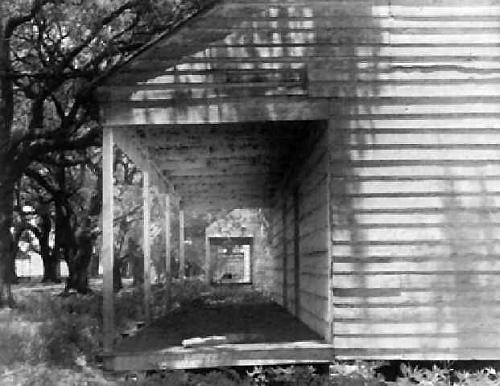
Clarence John Laughlin
_______________________
Cultural Characteristics of the Tea Party Movement
American Sociological Association
"Authoritarianism, ontological insecurity (fear of change), libertarianism and nativism."
_______________________
An Empty Regard
William Deresiewicz
“America needs heroes,” it is sometimes said, a phrase that’s often uttered in a wistful tone, almost cooingly, as if we were talking about a lonely child. But do we really “need heroes”? We need leaders, who marshal us to the muddle. We need role models, who show us how to deal with it. But what we really need are citizens, who refuse to infantilize themselves with talk of heroes and put their shoulders to the public wheel instead. The political scientist Jonathan Weiler sees the cult of the uniform as a kind of citizenship-by-proxy. Soldiers and cops and firefighters, he argues, embody a notion of public service to which the rest of us are now no more than spectators. What we really need, in other words, is a swift kick in the pants.
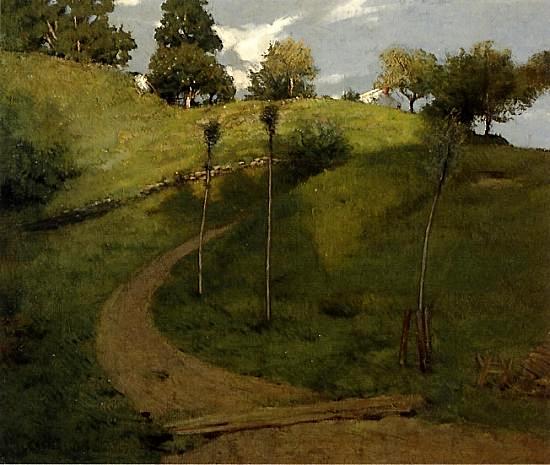
Lengthening Shadows
1887
Julian Alden Weir
(August 30, 1852 – December 8, 1919)
_______________________
Walking
Thomas Bernhard
Translated by Kenneth Northcott
conjunctions
Whereas, before Karrer went mad, I used to go walking with Oehler only on Wednesdays, now I go walking--now that Karrer has gone mad--with Oehler on Monday as well. ... If we hear something, says Oehler, on Wednesday we check what we have heard and we check what we have heard until we have to say that what we have heard is not true, what we have heard is a lie. If we see something, we check what we see until we are forced to say that what we are looking at is horrible. Thus throughout our lives we never escape from what is horrible and what is untrue, the lie, says Oehler. If we do something, we think about what we are doing until we are forced to say that it is something nasty, something low, something outrageous, what we are doing is something terribly hopeless and that what we are doing is in the nature of things obviously false. Thus every day becomes hell for us whether we like it or not, and what we think will, if we think about it, if we have the requisite coolness of intellect and acuity of intellect, always become something nasty, something low and superfluous which will depress us in the most shattering manner for the whole of our lives. For, everything that is thought is superfluous. Nature does not need thought, says Oehler, only human pride incessantly thinks into nature its thinking....(more)
_______________________
A Walk to Remember to Remember
Jesse Miller
Full-Stop
(....)... a quick look at the way we talk about stories reveals an intimate relationship between the way we think about life, narrative and bipedalism. “If life is a journey,” writes Rebecca Solnit, “then when we are actually journeying our lives have become tangible, with goals we can move toward, progress we can see, achievement we can understand, metaphors united with actions.” We tend to translate the abstract and intangible into the graspable, physical realm through metaphor. So, for example, illusory time becomes a line that stretches out in front of us like a road we walk along throughout life, looking back on our pasts, moving forward from our mistakes, a road filled with unexpected twists and uphill battles, steep ascents of suspense, swamps of indecision, and two roads diverging in a wood (ask any middle schooler what that means). Miranda July captures these layered meanings of walking in her installation, “The Hallway.” Here, walking down a hallway is the action by which the viewer moves through a narrative and the moving through narrative is a means of signifying the movement through a life.
(....)
Such a simple activity, this walking, which like breathing quickly loses itself in the implicit background of human processes, but try describing how to do it to a tree or a lamppost, or some other being for whom, ‘lift your leg, move it forward, put it down’ does not suffice, and you soon lose yourself in questions that go way deep, questions like, what is the relationship between time and space, and, where am I in relation to the body I call mine. A discussion of walking is never merely an explication of a biological act, but about, as Rebecca Solnit explains in Wanderlust: A History of Walking, “how we invest universal acts with particular meanings.” And walking has attracted around it a plentitude of those, spanning from the religious (pilgrimages) to the political (marches) to the social (promenades). An investigation of walking, not just as an activity but a dynamic cultural artifact that has been imbued with various meanings and significances over time, reveals the values and assumptions prevalent in and important to individuals and groups of people at different times and different places. By examining where, when, how and why walking is used and represented in art and literature we are thus provided ample opportunity to analyze those cultural aspects fossilized in their form and content.
The subject of urban walking in particular has fascinated writers and artists from Rousseau to Auster, and their works reflect the ways in which we designate the boundaries between humans, the built environment, and nature, sometimes in ways more complex than those theorizing on the topic....(more)
_______________________
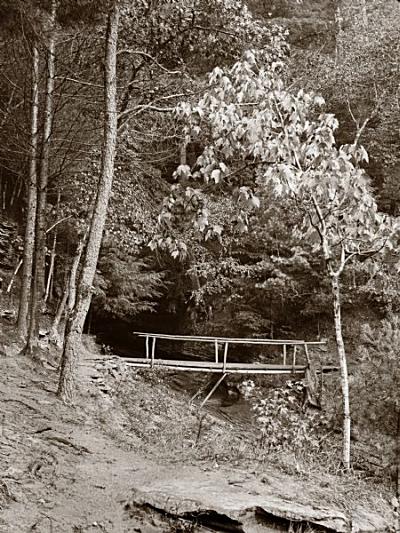
H. H. Bennett
(1843 - 1908)
Wisconsin Historical Society
_______________________
Cambden the nourice of antiquitie,
And lanterne vnto late succeeding age,
To see the light of simple veritie,
Buried in ruines, through the great outrage
Of her owne people, led with warlike rage;
Cambden, though Time all moniments obscure,
Yet thy iust labours euer shall endure.
But whie (vnhappie wight) doo I thus crie,
And grieue that my remembrance quite is raced
Out of the knowledge of posteritie,
And all my antique moniments defaced?
Sith I doo dailie see things highest placed,
So soone as fates their vitall thred haue neuer borne.
Edmund Spenser, The Ruines of Time
Translated Geographies: Edmund Spenser's "The Ruines of Time"Huw Griffiths
The two ironic movements that I want to talk about in relation to "The Ruines of Time" are the trope of the ruin and the troping mechanism of translation. In turn, both these movements will be looked at in relation to the Elizabethan development of a national geography. So, whilst this paper has a particularly narrow focus -- one relatively obscure poem by Edmund Spenser -- I believe it to have broader significances in a wider project that might seek to interrogate the notion of translation within the national cultures of the early modern period. One way of performing that interrogation of translation within a nationalist context is to rethink translation in spatial terms. Homi Bhabha has written on this in a postcolonial framework in his essay, "How Newness Enters the World." There he talks about "the disjunctive temporality of translation" which "reveals the intimate differences between genealogies and geographies." The movement of a translation across borders reveals the ironies of the nationalist project, rooted in heredity -- the ancient history of the nation. Translation's "disjunctive temporality," crossing and marking the borders of time and space, renders ironic a national history based on self recognition and continuity. The spatial implications of the word "translation" of course have a history that extends beyond postmodern critique, and the paper will also look at the functioning of the early modern translatio imperii in Spenser's poem...(more)
Literature and Geography
Early Modern Literary Studies 4.2/ Special Issue 3 (September, 1998)
_______________________
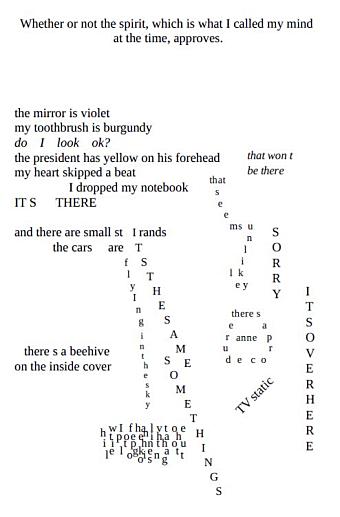
Country Girl
Edward Engdahl
a tribute to Hanna Weiner
CLAIR STYLE. SEEN WORDS. In a dream Hannah Weiner wrote "I SEE WORDS" on my forehead and she communicates with me silently. This book is a culmination / combination of these communications.
_______________________
The punitive regulation of poverty in the neoliberal age
Loļc Wacquant
... the ramping up of the penal wing of the state is a response to social insecurity, and not a reaction to crime trends. (....)
we need to break out of the crime-and-punishment box and pay attention to the extra-penological functions of penal institutions. Then we discover that, in the wake of the race riots of the 1960s, the police, courts and prison have been deployed to contain the urban dislocations wrought by economic deregulation and the implosion of the ghetto as an ethno-racial container, and to impose the discipline of insecure employment at the bottom of the polarizing class structure. As a result, the resurging prison has come to serve three missions that have little to do with crime control: to bend the fractions of the post-industrial working class to precarious wage-work; to warehouse their most disruptive or superfluous elements; and to patrol the boundaries of the deserving citizenry while reasserting the authority of the state in the restricted domain it now assigns itself. ...(more)
_______________________
Idiot Wind
The Eternal Return of the Politics of the 1970s
Phil Rockstroh
Unpopular wars drag on, gas prices erratically rise and inexplicably fall, as clouds of cynicism, dark as Richard Nixon’s perpetual five o’clock shadow, brood over the length of the U.S. At times, it seems as though Nixon’s 1970s never ended: Only Ronald Reagan’s/Bill Clinton’s/Barack Obama’s Quaalude-laced, faux populist snake oil caused the nation collectively to slip into a soporific sleep — and now, with the effects of the drug wearing off, we begin to awaken…hung over, groggy, queasy…still in the midst of that ugly and odious era.
At least, that’s the encrypted message I’ve deciphered using my Super-Secret, Zeitgeist Decoder Mood (disorder) Ring, special limited, Michele Bachman edition.
(....)
... if there is a presiding spirit possessing our age, it is the gray ghost of Richard Nixon who sat, stoop shouldered and scheming, in the Oval Office, in the early 1970s, as the U.S. began hitting the limits of its imperial might and economic power, and who set the tone of duplicity and denial that define daily life in the nation to this day.
(....)
here’s a plot spoiler regarding the stagecraft of the next presidential election cycle. Republicans — Bachmann, Perry et al will play their roles as scary, scary psychos — escapees from the Right Wing Christian Madhouse For Social Program Ax Murderers — as Obama will play the calm, reasonable, deliberate authority figure who, after the crazies are dispatched, will calmly and deliberately slash to bits Social Security and Medicare — and then feed the remains to the economy-devouring cannibals on Wall Street....(more)
_______________________
The corruption and collapse of the rule of law, in the financial sphere, is basically irreparable. It’s not just that restoring trust takes a long time. It’s that under the new technological order in this field, it cannot be done. The technologies are designed to sow and foster distrust and that is the consequence of using them. The recent experience proves this, it seems to me. And therefore there can be no return to the way things were before. In other words, we are at the end of the illusion of a marketplace in the financial sphere.
-
James K. Galbraith, from a keynote lecture on post-Keynesian economics, 13.05.2011 Realism(s) #16, or: notes on mechanical reproduction
Matthew Flanagan
Landscape Suicide
_______________________
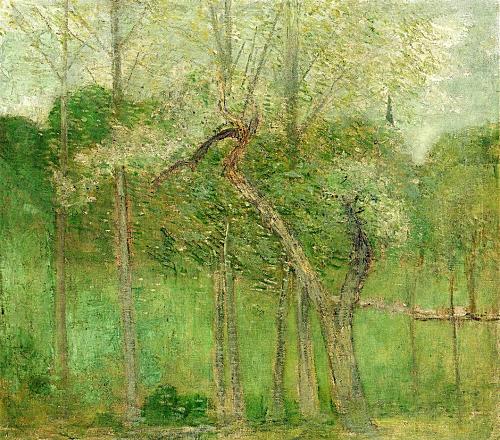
Landscape with Steeple, Wyndham
Julian Alden Weir
circa 1892
_______________________
On Beauty
A history of a western idea
edited by Umberto Eco
Translated by Alastair McEwen
mediafire pdf
On Ugliness
Translated by Alastair McEwen
edited by Umberto Eco
mediafire pdf
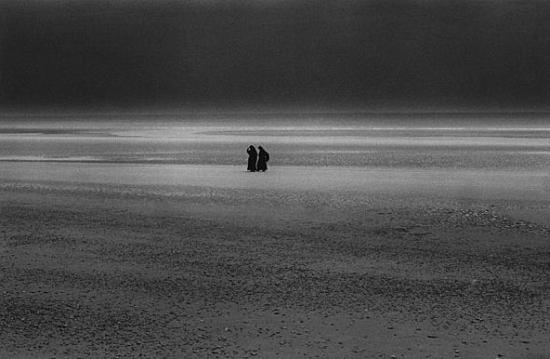
Jeanloup Sieff
1933 – 2000
_______________________
what if a much of a which of a wind
gives the truth to summer's lie;
bloodies with dizzying leaves the sun
and yanks immortal stars awry?
Blow king to beggar and queen to seem
(blow friend to fiend: blow space to time)
_when skies are hanged and oceans drowned,
the single secret will still be man
what if a keen of a lean wind flays
screaming hills with sleet and snow:
strangles valleys by ropes of things
and stifles forests in white ago?
Blow hope to terror; blow seeing to blind
(blow pity to envy and soul to mind)
_whose hearts are mountains, roots are trees,
it's they shall cry hello to the spring
what if a dawn of a doom of a dream
bites this universe in two,
peels forever out of his grave
and sprinkles nowhere with me and you?
Blow soon to never and never to twice
(blow life to isn't: blow death to was)
_all nothing's only our hugest home;
the most who die, the more we live.
-
e.e. cummings
_______________________

Jeanloup Sieff
_______________________
Cosmos and History
The Journal of Natural and Social Philosophy
Vol 6, No 2 (2010)
The Poetics of Resistance
Translation as Aesthetic Resistance: Paratranslating Walter Benjamin
Burghard Baltrusch
Abstract
This essay is a brief study of translation as a practice of aesthetic resistance seen from a historical and philosophical perspective. Translation is perceived as the process of transition and negotiation within the ‘third space’ between various different hybrid cultural contexts and their discursive constraints, and referred to as ‘paratranslation’. It summarises the first attempts to think of translation as an almost ‘holistic’ paradigm and the aesthetics of intervention from Romantic philosophy onwards. It attempts to show how Walter Benjamin’s master narrative, the utopia of ‘pure language’, encourages continuous resistance to the totalitarianism of the idea of the ‘original’, to aesthetics (within the sense of the perception of the real) and to dominant discourses. It subsequently defines the idea of ‘progress’, which considers translation as aesthetic resistance, as a process of construction in constant deconstruction. It concludes by exemplifying the notion of translation as a paradigm of intervention in modernity with a brief analysis of the transcreation performed by Erin Mouré on Fernando Pessoa/Alberto Caeiro’s poetic cycle, O Guardador de Rebanhos (The Keeper of Sheep).
_______________________
The Sublime
Simon Morley (ed.)
pdf available at monoskop
Artists surveyed include: Marina Abramovic, Joseph Beuys, Tacita Dean, Walter De Maria, A K Dolven, Olafur Eliasson, Andreas Gursky, Jitka Hanzlovį, Gary Hill, Susan Hiller, Shirazeh Houshiary, Anish Kapoor, Mike Kelley, Anselm Kiefer, Yves Klein, Richard Long, Barnett Newman, Tony Oursler, Cornelia Parker, Gerhard Richter, Doris Salcedo, Lorna Simpson, Hiroshi Sugimoto, Fred Tomaselli, James Turrell, Luc Tuymans, Bill Viola, Zhang Huan
Writers include: Marco Belpoliti, John Berger, Paul Crowther, Jacques Derrida, Okwui Enwezor, Jean Fisher, Barbara Claire Freeman, Jeremy Gilbert-Rolfe, Doreet LeVitte-Harten, Eleanor Heartney, Lynn M. Herbert, Luce Irigaray, Fredric Jameson, Lee Joon, Julia Kristeva, Jean-Franēois Lyotard, Thomas McEvilley, Vijay Mishra, David Morgan, Jean-Luc Nancy, Jacques Rancičre, Gene Ray, Robert Rosenblum, Philip Shaw, Marina Warner, Thomas Weiskel, Slavoj ˇi˛ek
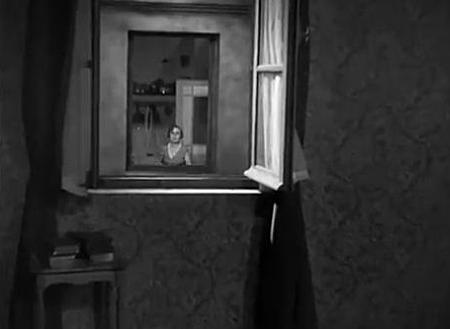
Boudu sauvé des eaux
Jean Renoir
1932
youtube
_______________________
The Self-Dismembered Man:
selected later poems
Guillaume Apollinaire
translated by Donald Revell
google booksThe Windows
All the yellow dies from red to green
Where parakeets sing in the first woods
Pihi giblets
There is a poem to make about the bird with just one wing
We'll phone it in
Gigantic trauma
Brings tears to my eyes
Behold a young pretty girl amidst the youth of Turin
The poor boy sneezed in his white cravat
I'll raise the curtain
And voila the opening window
Spiders when my hands wove the light
Beauty pallor fathomless flowers
We'll fail at shuteye
We'll start over at midnight
If you've got the time you've got the freedom
Winkles codfish polysuns and sundown urchins
A yellow pair of old boots in front of the window
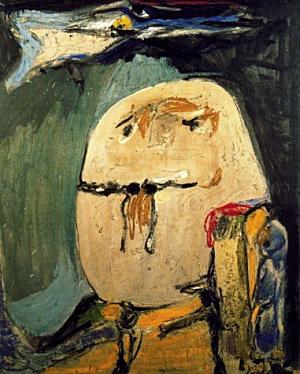
Guillaume Apollinaire
August 26, 1880 – November 9, 1918
Asger Jorn
1956
Alcools: poems
Guillaume Apollinaire
translated by Donald Revell
google books
Towers
Towers are the streets
Wells
Wells are plazas
Wells
Hollow trees harbor vagabond half-breeds
Mulattoes sing mournfully
To noisy mulattoes
And the wa-wa goose trumpets northward
Where raccoon hunters
Scrape pelts
Vancouver
Glittery diamond
Where snow-white trains and nightlife fly from winter
O Paris
The yellow dies from red to green
Paris Vancouver Hyeres Maintenon New York and the Antilles
The window opens like an orange
Handsome sunshine food
-
Guillaume Apollinaire (translated by Donald Revell)
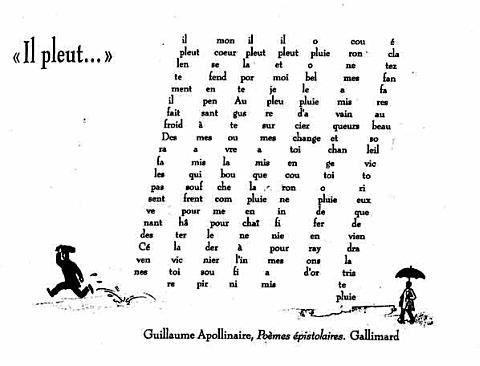
Apollinaire’s Calligrammes
_______________________
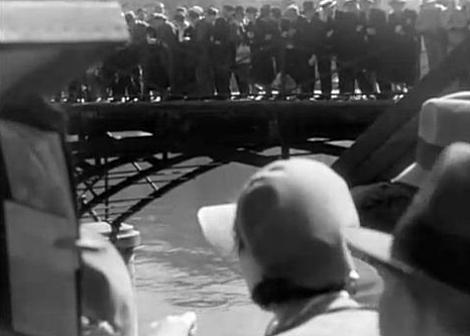
Boudu sauvé des eaux
Jean Renoir
1932
_______________________
"The quotation in my works are like robbers lying in ambush on the highway to attack the passerby with weapons drawn and rob him of his conviction."
(...)
Benjamin, who for his entire life pursued the idea of writing a work made up entirely of quotations, had understood that the authority involved by the quotation is founded precisely on the destruction of the authority that is attributed to a certain text by its situation in the history of culture.
(...)
This particular way of entering into a relation with the past also constitutes the foundation of the activity of a figure with which Benjamin felt an instictive affinity: that of the collector. The collector also "quotes" the object outside its context and in this way destroys the order inside which it finds its value and meaning.
(...)
The interruption of tradition, which is for us now a fait accompli, opens an era in which no link is possible between old and new, if not the infinite accumulation of the old in a sort of monstrous archive or the alientation effected by the very means that is supposed to help with the transmissin of the old. Like the castle in Kafka's novel, which burdens the village with the obscurity of its decrees and the multiplicity of its offices, the accumulated culture has lost its living meaning and hangs over man like a threat in which he can in no way recognize himself. Suspended in the void between old and new, past and future, man is projected into time as into somethin alien that incessantly elludes him and still drags him forward, but without allowing him to find his ground in it.
-
Giorgio Agamben, The Man Wiithout Content, translated by Georgia Albert
_______________________

photo - mw
_______________________
from Translating Translating Apollinaire
A Preliminary Report
bpNichol
TTA 4: original version
Icharrus winging up
Simon the Magician from Judea high in a tree,
everyone reaching for the sun
great towers of stone
built by the Aztecs, tearing their hearts out
to offer them, wet and beating
mountains,
cold wind, Macchu Piccu hiding in the sun
unfound for centuries
cars whizzing by, sun
thru trees passing, a dozen
new wave films, flickering
on drivers' glasses
flat on their backs in the grass
a dozen bodies slowly turning brown
sun glares off the pages, "soleil
cou coupé", rolls in my window
flat on my back on the floor
becoming aware of it
for an instant
...(more)
_______________________
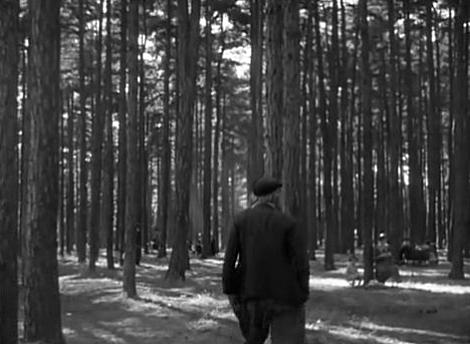
Boudu sauvé des eaux
Jean Renoir
1932
_______________________
A User's Guide to Capitalism and Schizophrenia:
Deviations from Deleuze and Guattari
Brian Massumi
mediafire pdf

photo - mw
_______________________
Stone Would Be Water
Stone would be water
But it cannot undo
Its own hardness
Rocks might run
Wild as torrents
Plunged upon the sky
By cliffs none climb
Who makes fountains
Spring from flint
Who dares tell
One thirsting
There’s a well
Samuel Menashe - Poems
archipelago
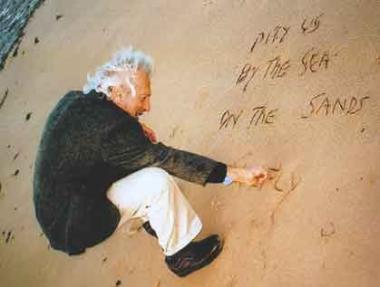
Samuel Menashe
September 16, 1925 – August 22, 2011
photo - Martin Duffy
Samuel Menashe at the Poetry Foundation
Reeds Rise From Water
Samuel Menashe
rippling under my eyes
Bulrushes tuft the shore
At every instance I expect
what is hidden everywhere
_______________________
Li Po’s Letter To Lao Tzu
Martin Burke
This way, that way, there it was where there it wasn’t, and one name as good as another where neither could describe it
Yet each of us were there with desires and passions which were thought of as different but which were the same
As if as soon as you opened one gate you had to open another
Something which, while not burdensome in itself, seemed as endless as the path I had without knowing what I was doing put my foot on
For every word I possessed they possessed an altered version which I could never make my own
Lexicons were studied daily, then adjusted to some new condition of which I knew nothing
(....)
As was to be expected the path led to a well but I could no more name the well than I could the path
You might be surprised to hear me say this after having said that I was not surprised but the wisdom which serves you in one field is not necessarily right for the new field you walk in
Bucket after bucket–I lowered the rope on a pulley but there was always as much water remaining as there was of what I took from it
I was at that point of exhaustion the well would never reach
At which if there was ironic laughter it did not come from me who lowered the bucket again, stubbornly human as I am
...(more)
Otoliths twenty-two
_______________________

photo - mw
_______________________
A path through the forest
is merely where the trees aren’t:
a clearing or absence.
What is it? Where is it?
These are not exactly the right questions;
it is an absence in space
that is also the way you are going.
It is surrounded by trees;
if it had a nature, that would be it:
the stuff all around it that touches
and shapes the emptiness within it.
But that’s where you move, isn’t it?
That’s how and where you go.
It is a useful emptiness, an effective absence.
You’ve never left it, even if you think you have,
and everything you’ve seen, you’ve seen from it.
I know it because here I am.
- Crispin Sartwell
HERE / NOW / HERE
The Green Door
Issue 4 edited by Martin Burke Kari Bert / Mira Borghs / Martin Burke / Rodica Draghincescu / Robert Gibbons / Crispin Sartwell / Richard Von Sturmer
One doesn’t simply run head-on into Goya snorting some interpretation, or other. Nor stroll through the gallery of history as Nietzsche warns against in his Untimely Meditations without suffering life from the ground up. Rather, run gauntlet. Fight against one’s Time. I’m not gazing at any specific work, but Goya’s vicious brushstrokes, fierce blacks, penetrating vortexes, barely audible grunts & barks as titles swirl, hurt brain & viscera, make black blood blue. To get to Goya is to go through Lorca through Guernica through gore of bull & sword, peasant & starvation, through that which is unimaginably worse. One doesn’t simply say rape, torture, mutilation without potential disastrous ramification, but blood is in the veins till running from gash & wound into the ground, when Death grants another pardon in order to lift pen, & crack voice open as vessel. Stark, raving, angered at injustice, typing on the keyboard till fingerprints are raw, then gone.
- Robert Gibbons
...(more)
_______________________
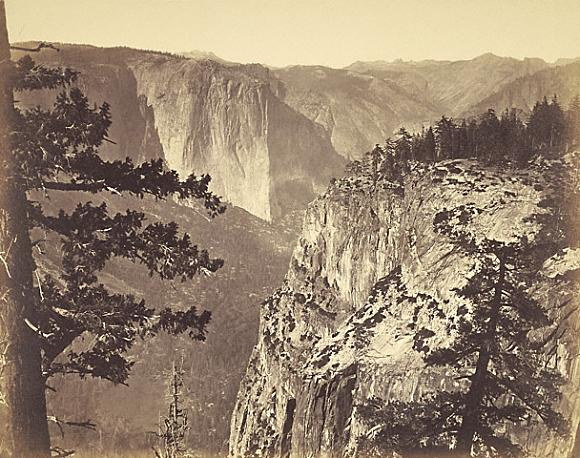
First View of the Valley
about 1866
Carleton E. Watkins
.....................................................
Watkins, after "Chaos"
Tom Clark
...So I lay awake in the dark thinking of Carleton
Watkins, blind, agéd, his mind slowly deteriorating in the State
Hospital for the Insane at Napa -- alone,
destitute, forsaken -- his wife, younger, once his assistant, having
now taken to referring to herself as his "widow"
for convenience -- the man who had invented the mammoth camera,
who had made the world aware of Yosemite Valley,
ascended the Whitney Glacier, explored the Columbia River Gorge,
given the surging power of nature at The Geysers
image life -- imagining Watkins' broken
consciousness adrift and wandering amid an endless flow of broken
images --
...(more)
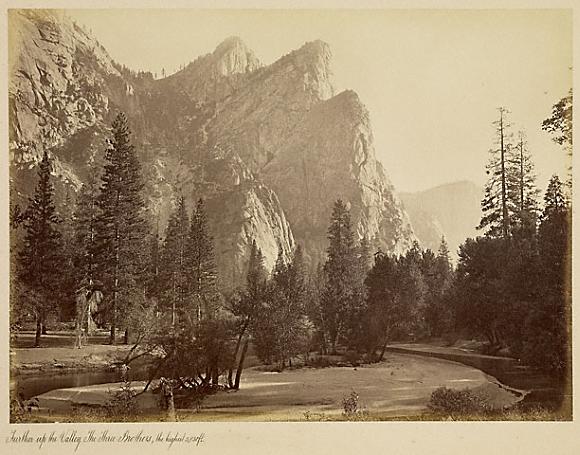
The Three Brothers
Yosemite
Carleton E. Watkins
(1829-1916)
_______________________
It is forbidden to kill; therefore all murderers are punished unless they kill in large numbers and to the sound of trumpets.
-
Voltaire
_______________________
Governments Kill
John Feffer
(....)
Governments, in other words, kill on our behalf. This arrangement is a form of social contract, which means that governments are basically contract killers. Some states, like Nazi Germany, use the tremendous power of arms and bureaucracy to transform their territories into slaughterhouses. Regimes that are merely authoritarian can be equally brutal but display a greater selectivity in their tyranny. In our more decorous democracies, meanwhile, we perfume our conversations with words like "justice" and "national security" to mask the odor of death.
Americans have never been entirely comfortable with this bargain. We have a long tradition of taking the law into our own hands, beginning with our own hallowed revolution. During the Reconstruction period, lynch mobs were a continuation of the Civil War by other means. More recently, a variety of paramilitary organizations have flourished, from the racist Posse Comitatus chapters that sprang up in the late 1960s to more recent anti-immigrant militias like the Minutemen. Even suburban soccer moms have zealously defended their "right" to bear arms. On the other side of the spectrum, meanwhile, a broad-based coalition has challenged the government's "right" to kill citizens through the death penalty. And an equally diverse movement has protested the government's waging of wars overseas....(more)
Institute for Policy Studies
_______________________
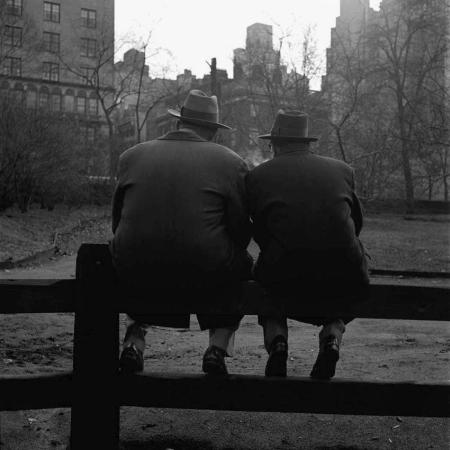
New York
Vivian Maier
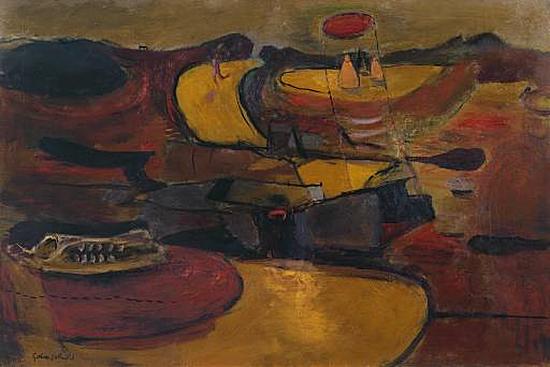
Welsh Landscape with Roads
1936
Graham Sutherland
b. August 24, 1903
_______________________
searching for stories from society's submerged
Cristian Aliaga
I've tried to get away from the centre. And you have to understand that for someone coming from Patagonia to the UK, that's a journey to the centre. But even here the periphery exists. These are places where underneath the market and consumerism and their absolute uniformity – service stations that are identical a hundred miles apart, and I'm sure it's only a matter of time before the coffee chains reach Patagonia too – underneath all that there's another form of knowledge. Often what you see is painful, or the result of destruction: farmers and industrial workers turned into the unemployed or deskilled.
I've been struck a lot by the buildings I've seen here. Stone has an incredible weight in this country. I say this as someone coming from the Americas, where any building over a hundred years old is considered ancient. Here you can see towns that have been literally crushed. Yet people are constantly in contact with previous structures, with old buildings.
You see the way the market conditions everything, including the places people live and work: for example farms turned into tourist attractions, and people who live sort of two lives at once, doing their job, and doing it as a tourist attraction, inhabiting a world that's built and built-over at once.
These places offer a staged version of history, a series of myths and legends. It's a version for those passing through, but I'm interested in what the version that the people who aren't going anywhere would tell to themselves. What is the story that the farmer tells when the tourists have gone home? Or barman of the abandoned pub would tell? Capitalism leaves people submerged, so my writing tries to find the ways that people save something of themselves....(more)
The Other Side of the European Travels: Indigenous Peoples, Renagades, Outcasts and the Literature on Patagonia
Cristian Aliaga epilogue to
Patagonia: myths and realities
ed. by Fernanda Peńaloza, Claudio Canaparo, Jason Wilson
_______________________
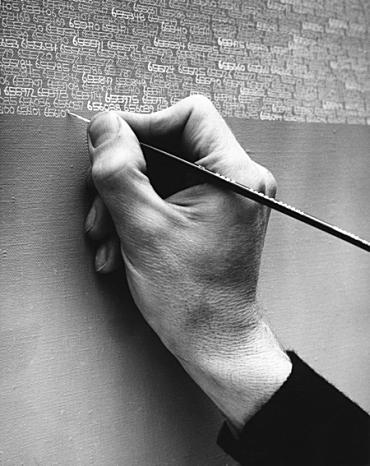
Roman Opalka
(August 27, 1931 – August 6, 2011)
.....................................................
Running the Numbers
For Roman Opalka, counting was living.
Stefany Anne Golberg
smart set
In 1965, while waiting in a cafe, Roman Opalka decided to paint time. He didn’t paint the counters of time — clocks and watches and calendars and such. He didn’t paint people waiting for the bus or racing to the finish line. Roman Opalka painted time itself. He called this project, his life’s work, “OPALKA 1965 / 1 — 8.” The title might be read as this: (Roman) Opalka (the artist begins in) 1965 (painting numbers from) one to infinity.
Having decided to paint time, the French-Polish conceptual artist went to his Warsaw studio and prepared a canvas. He sat before it. His hand trembled. He knew that once he started this immense project, he could never go back. Armed with a size 0 brush, and still shaking, Opalka painted in white a little “1” on the upper left-hand corner of a gray canvas. He then made his way horizontally across the canvas, number by number—2…3…4…5 — until he had a row of numbers, then two rows of numbers, then three. When Opalka ran out of room, when the last number was painted in the bottom right-hand corner, he stopped. Later, the artist made another painting, and another, each one picking up numerically where the last painting left off. He called the paintings “Details.” The canvas was always the same size: 196 centimeters by 135 centimeters. The numbers were always painted in white. When Opalka made a Detail, he recorded himself speaking the numbers as he painted. When a painting session was finished, Opalka would take a photograph of his face in front of his work, the numbers stopping when he did. Opalka devoted himself to this project alone, painting time. “All my work is a single thing,” he once wrote, “the description from number one to infinity.”...(more)
.....................................................
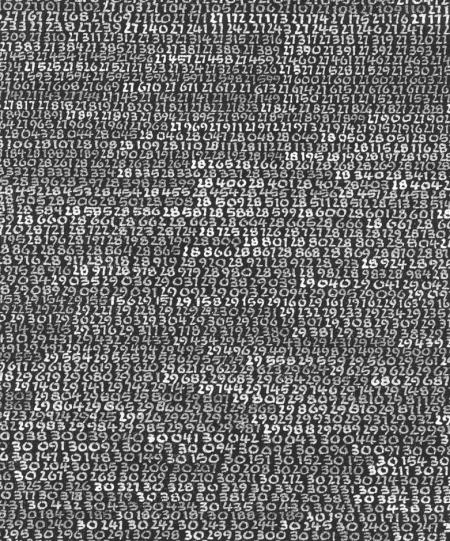
_______________________
"The only thing worse than nostalgia is no feeling of loss at all."
Paul Outka:
... the question is, what use do we make of the pastoral, rather than trying to determine its content or how that preexisting content supposedly comes into our culture. That said, I do think the pastoral as a landscape and an experience has a structure. And the way I would define that structure is as an in-between space, a space that is, first, self-generatingly natural. So, it's not a concentrated animal feeding operation. It has a strong non-human presence. But, second, it also testifies everywhere to the presence of human beings. It's cleared land. There are no predators -- not if those iconic shepherds and shepherdesses are doing their jobs. It's not a monoculture, but itfs also not just what would be there without human intervention. It's not a wilderness, but a made space, a made natural space. It's in between what we would think of as wilderness and what we might think of as urban.
It also generally involves an experience of transition towards nature for the subject. It is rare that somebody comes in from the wilderness to describe the pastoral. Rather, people leave the city, they go "home," -- and their pastoral home is often a place they've never been -- and they experience renewal. So you can think of the pastoral as a green trajectory, as much as a location. It is a movement.
Given those two things, the pastoral starts to sound to me, a post-despair ecocritic, like post-Natural nature, a.k.a the only nature we have left. So, my corollary is this: if a radical pastoral is not possible, then a radical environmentalism is not possible. Because this is the ground we now work with. Nature no longer signifies a pure, untouched, extra-human space, but rather one where everywhere we find ourselves. “Cosmopolitics & the Radical Pastoral” a roundtable Journal of Ecocriticism
Vol 3, No 2 (2011)
via Steve Himmer
_______________________

Pecken Wood
Graham Sutherland
1925
_______________________
Oblomov
Ivan Aleksandrovich Goncharov
Translated from the Russian by C. J. Hogarth
(....)
We find ourselves transported to a land where neither sea nor mountains nor crags nor precipices nor lonely forests exist--where, in short, there exists nothing grand or wild or immense.
Of what advantage, indeed, is the grand, the immense? The ocean depresses the soul of man, and at the sight of its boundless expanse of billows--an expanse whereon the weary eye is allowed no resting-place from the uniformity of the picture--the heart of man grows troubled within him, and he derives no solace from the roaring and mad rolling of the waves. Ever since the world began, those waves have sung the same dim, enigmatical song. Ever since the world began, they have voiced but the querulous lament of a monster which, everlastingly doomed to torment, utters a chorus of shrill, malicious cries. On the shores of the sea no bird warbles; only the silent gulls, like lost spirits, flit wearily along its margin, or circle over its surface. In the presence of that turmoil of nature the roar even of the wildest beast sounds weak, and the voice of man becomes wholly overwhelmed. Yes, beside it man's form looks so small and fragile that it is swallowed up amid the myriad details of the gigantic picture. That alone may be why contemplation of the ocean depresses man's soul. During periods, also, of calm and immobility his spirit derives no comfort from the spectacle; for in the scarcely perceptible oscillation of the watery mass he sees ever the slumbering, incomprehensible force which, until recently, has been mocking his proud will and, as it were, submerging his boldest schemes, his most dearly cherished labours and endeavours.
In the same way, mountains and gorges were not created to afford man encouragement, inasmuch as, with their terrible, menacing aspect, they seem to him the fangs and talons of some gigantic wild beast--of a beast which is reaching forth in an effort to devour him. Too vividly they remind him of his own frail build; too painfully they cause him to go in fear for his life. And over the summits of those crags and precipices the heavens look so remote and unattainable that they seem to have become removed out of the ken of humanity.
Not so that peaceful corner of the earth upon which our hero, in his slumber, opened his eyes. There, on the contrary, the heavens seemed to hug the earth--not in order that they might the better aim their thunderbolts, but in order that they might the closer enfold it in a loving embrace. In fact, they hovered low in order that, like a sheltering, paternal roof, they might guard this chosen corner of the earth from every adversity. Meanwhile the sun shone warm and bright during half the year, and, withdrawing, did so so slowly and reluctantly that it seemed ever to be turning back for one more look at the beloved spot, as though wishing to give it one more bright, warm day before the approaching weather of autumn. Also the hills of that spot were no more than reduced models of the terrible mountains which, in other localities, rear themselves to aff right the imagination. Rather, they resembled the gentle slopes down which one may roll in sport, or where one may sit and gaze dreamily at the declining sun. Below them, toying and frisking, ran a stream. In one place it discharged itself into a broad pool, in another it hurried along in a narrow thread, in a third it slackened its pace to a sudden mood of reverie, and, barely gliding over the stones, threw out on either side small rivulets whereof the gentle burbling seemed to invite sleep. Everywhere the vicinity of this corner of the earth presented a series of landscape studies and cheerful, smiling vistas. The sandy, shelving bank of the stream, a small copse which descended from the summit of that bank to the water, a winding ravine of which the depths were penetrated by a rill, a plantation of birch-trees--all these things seemed purposely to be fitted into one another, and to have been drawn by the hand of a master. Both the troubled heart and the heart which has never known care might have yearned to hide themselves in this forgotten corner of the world, and to live its life of ineffable happiness. Everything promised a quiet existence which should last until the grey hairs were come, and thereafter a death so gradual as almost to resemble the approach of sleep. _______________________

Viktor Pivovarov
Works for Children
from the 60s and 70s
50watts

for Jack
photo - mw
Jack Layton
July 18, 1950 – August 22, 2011
_______________________
Toxic Culture
A unified theory of mental pollution
Micah M. White
adbusters
Since Zola, ... mental environmentalism has been stuck in a philosophical morass. To claim that advertising is metaphorically mental pollution is one thing, namely an easily dismissible rhetorical flourish. To say that advertising is literally a kind of pollution and that TV commercials and highway billboards are more closely related to toxic sludge than to speech is another matter entirely. And while mental environmentalists have always tried to make the latter argument, they have more often been forced to retreat to the former. Where is the evidence that advertising is a species of pollution? Isn’t it obvious that a corporate slogan is nothing but glorified, commercialized speech?
Into this difficult question has stepped one of the greatest living philosophers, the eccentric Michel Serres, who has written the inaugural philosophical work of the mental environmentalist movement. Malfeasance: Appropriation Through Pollution? is a radical reconception of pollution that cements its primal relation to advertising. The big idea of this recently translated book is that animals, humans included, use pollution to mark, claim and appropriate territory through defiling it, and that over time this appropriative act has evolved away from primitive pollution, urine and feces, to “hard pollution,” industrial chemicals, and finally to “soft pollution,” the many forms of advertising....(more)
_______________________
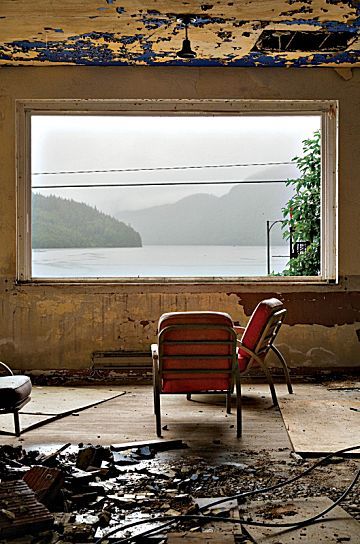
Ocean Falls
Land’s End
Christopher Grabowski
geist
_______________________
Against Functionalism
Asger Jorn
translated by Ken Knabb
bureau of public secrets
Art and the Popular University
(....)
“To understand the present” is, as has been well explained by the existentialists, to grasp the incoherence of things, to adopt the artistic perspective on existence. The sole inertia that exists for man is truth, and truth means identical repetition. Inertia itself is thus the fundamental basis of scientific education and of professional apprenticeship. Nothing further need be said about this.
The suppression of impromptu acts and incoherent thought, which industry and science make a virtue of opposing, is thus the very cause of the inertia that is increasingly pervading culture. A careerless woman who has seen much of the world seems more cultivated than others precisely because most of her ideas are incoherent and useless. If we shift to ideas linked with concrete interests, we will see that the latter are extremely limited.
The question will not be resolved by rationalizing the educational system, nor by introducing a Ministry of Destruction, if such an institution is not supported by a powerful will in the people themselves, an artistic will, a creative will. But how to bring this about?...(more)
_______________________
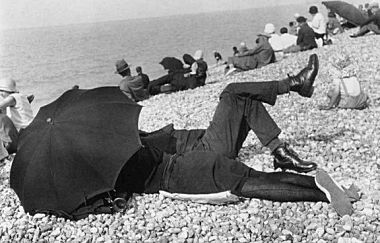
Dieppe, France
1926
Henri Cartier-Bresson
(August 22, 1908 - August 3, 2004)
_______________________
We must select the illusion which appeals to our temperament,
and embrace it with passion.
-
Cyril Connolly (1903-1974)
_______________________
Remarks Prepared For The Inaugural Launch Of The Mississippi Megalops:
Cadmus, The Great Blooming Void, And The Last Performance Of A Celebrated Castrato
Brad Zellar
(....)
Salvatorri's trip to America --billed as the "The Grand Tour of a Celebrated Castrato"-- was sponsored by a utopian community on the outskirts of a disreputable hamlet then called Cadmus, which had been thrown up downstream from St. Paul in the early years of the Civil War.
Cadmus was home to an adjunct military garrison to nearby Fort Snelling, as well as a trading post, a collection of motley merchants, the hovels of river men, a handful of unruly saloons, a busy boat landing, and --on its eastern fringe-- the Reverend Hosiah Hungwell's visionary encampment, The Great Blooming Void. The Great Blooming Void was characterized by the relative youth of its members, and espoused a mish mash of spiritual, philosophical, and psychological notions that incorporated the most attenuated tenets of both romanticism and the Enlightenment. Hungwell's acolytes were an eccentric and eclectic group; some were attracted by the promise of naturism and free love, others by the group's avowed pacifism and the Reverend's queer brand of futurism; still others by the opportunities for artistic expression and philosophical and scientific inquiry.
Hungwell had invented a "Dream Cradle," and his adherents utilized several different variants of this invention to stimulate dreams and visions. Hungwell was said to spend upwards of 16 hours a day in his own, specially customized Cradle, and he emerged from one such session with a vision of creating a new renaissance of castrati in America, which he called "a species of pure artists and laborers, keepers of mankind's purest dreams." This vision became the Reverend's latest pet obsession, and he began to make plans to bring a castrato from Europe to perform at the Great Blooming Void's annual "Summer of Love" festival, with the goal of raising public awareness and support for his campaign....(more)
_______________________
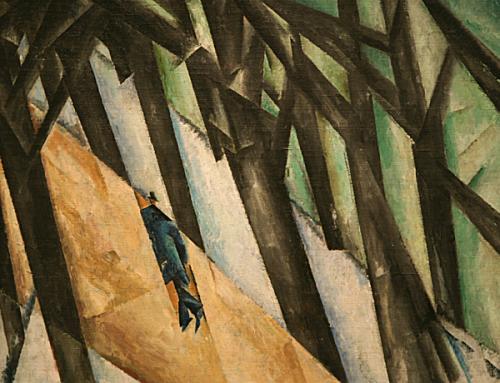 Road of Trees
Lyonel Feininger
(1871-1956)
Lyonel Feininger: At The Edge Of The World
June 30–october 16, 2011
whitney
_______________________
Ubuweb: Visual Poetry
Ubuweb: Visual PoetryUbuweb: Visual Poetry exposes little-seen exemplars of historical praxis and models of contemporary insight to a wider audience. This section includes anthologies, ephemeral publications, criticism and sporadic journals dedicated to visual poetry. Due to the elusive and ephemeral nature of concrete and visual poetry publications, there is a perceived lack of innovation in the genre. Without exposure to radical practice, artistic precedent and innovative models, concrete poets too often fall back upon familiar tropes and unchallenging forms.
Ubuweb: Visual Poetry is not presented under the rubric of historical coverage or indexical completeness, but rather as a document of isloate moments of what Haroldo de Campos argued was a "notion of literature not as craftsmanship but [...] as an industrial prcoess" where the poem is a "prototype" rather than the "typical handiwork of artistic artistry."
-
-- derek beaulieu, curator
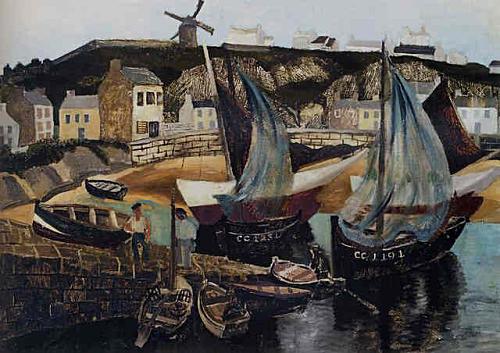
Boat in Harbour
Brittany 1929
Christopher Wood
d. Aug. 21, 1930
_______________________
Memory and Invention
Mavis Gallant
granta
(....)
Visual reminders are accurate, but only up to a point: an old photograph inevitably introduces the notion of quaintness. The image of that tragic girl lived with me for half a century, buried somewhere...Each rising generation forgets that people pictured as a street crowd, in some corner of past time, did not look strange or odd to one another. A picture needs human voices, popular music, scents, street sounds, the squeal of brakes, the heat and cold of the given moment. To admire a picture as a picture is one thing; to expect it to replace a memory seems to me hopeless.
Imagination, all invention, will occur spontaneously - occur or interfere. ‘Interference’ means it is false, mistaken, untrue. Although I have kept a journal for years, I never look anything up. A diary is not a dictionary or the record of a meeting. Sometimes a sharp, insistent image caught in one’s mind, perhaps of a stranger glimpsed only once, will become the living source of a whole story....(more)
_______________________
Where Shall I Wander
John Ashbery
2006
bookdepository
ifile pdf
Sonnet: More of Same
John Ashbery
Try to avoid the pattern that has been avoided,
the avoidance pattern. It’s not as easy as it looks:
The herringbone is floating eagerly up
from the herring to become parquet. Or whatever suits it.
New fractals clamor to be identical
to their sisters. Half of them succeed. The others
go on to be Provenēal floral prints some sleepy but ingenious
weaver created halfway through the eighteenth century,
and they never came to life until now.
It’s like practicing a scale: at once different and never the same.
Ask not why we do these things. Ask why we find them meaningful.
Ask the cuckoo transfixed in mid-flight
between the pagoda and the hermit’s rococo cave. He may tell you.
_______________________
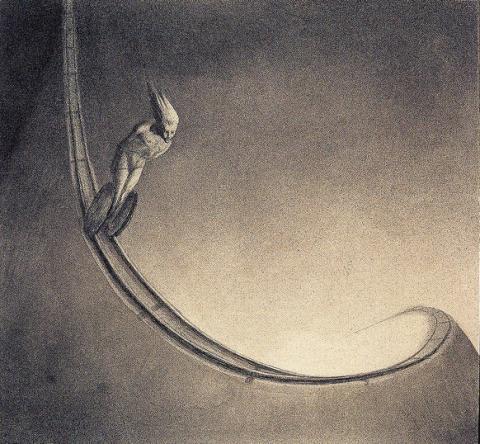
Alfred Kubin
d. Aug. 20, 1959
_______________________
Susan Elmslie’s things
rob mclennan
itemized, prose with line-breaks,
after photographs
what she would write about, whether
the stuff of kitchens,
or Glenn Goulds shoes
what archives honeycomb
in cool buildings
a professor sells his library,
& creates himself an opening
a Prospero of weightlessness
the bog people, tossing beads & gold
& whats left of their love
into stony future
preserved for years of glassware
& display
a box of loose paper & dust
floating against the decades Apertures
rob mclennan
free ebook from Argotist
"... a portrait of North American writing through the eyes of one of Canada's most active poet/critics."
via Nick Piombino
Argotist Online Free Ebooks
rob mclennan
Susan Elmslie
_______________________
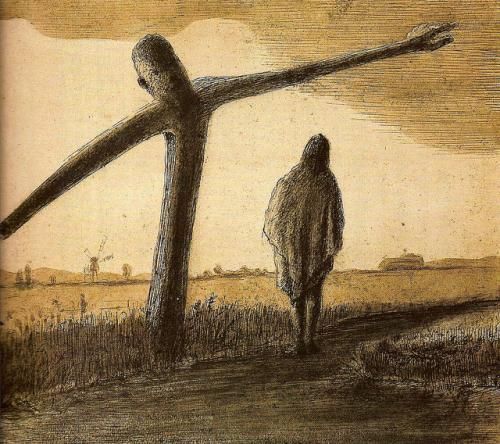
Alfred Kubin
_______________________
Where are all the Islamic terrorists?
Charles Kurzman
(....)
I am in the awkward position of undermining the importance of my own field. My research finds that Islamic terrorism has not posed as large a threat as reporters and the public think—certainly not as large a threat as Al Qaeda and its affiliates intended. They routinely complain about the failure of Muslims to join their movement.
Of the 56 million people who die each year around the world, around two million die from HIV/AIDS. Nearly one million die from malaria. Almost three quarters of a million die from violence. According to the National Counterterrorism Center, terrorism peaked in 2007 with 23,000 fatalities, half of them in Iraq—a terrible toll, but not a leading cause of death.
In the United States, 15,000 people are murdered each year. Islamic terrorism, including the Beltway sniper attacks, has accounted for almost three dozen deaths in America since 9/11—a small fraction of the violence that the country experiences every year. The toll would have been higher if the perpetrators had been more competent; for example, if Faisal Shahzad had used higher-quality materials in his Times Square car bomb. Even so, the number of perpetrators has been relatively low. Fewer than 200 Muslim-Americans have engaged in terrorist plots over the past decade—that’s out of a population of approximately two million. This constitutes a serious problem, but not nearly as grave as public concern would suggest....(more)
_______________________

cropped
Black Canyon
Colorado River
1871
Timothy H. O'Sullivan
(1840-1882) via Tom Clark
_______________________
A Visit to the House of Fools
John Ashbery
The year subsides into clouds
more beautiful than any I have seen—
drifting equestrian statues, washing lifted by the wind.
Down here bodies made somber by the cold
meet and diverge at angles. Nothing is given
that may not be retracted. Our fires are glacial,
lighting up the polar backdrop. If you came it
would be in mid-parenthesis now, season of your engaging,
seminar not going anywhere. (I must wall these off;
nothing but a tree would pass here.)
There is no record that some of it was taken out
and later replaced in the file.
The cliff of windows, some lit up, some broken,
allows that variousness will attract
and repel, like a happy ending, the way the truth hurts.
How can “rare earth” be an element?
Test tubes doze. A wide window watches the sea.
Others blow inward toward the room with its floor
like an itch that scratching redeems.
A ruler is pasted against the wall
to tell time by, but it’s too late. The snow’s
knack for seeking out and penetrating crevices
has finally become major news.
Let’s drink to that,
and the tenacity of just seeming.
from Where Shall I Wander
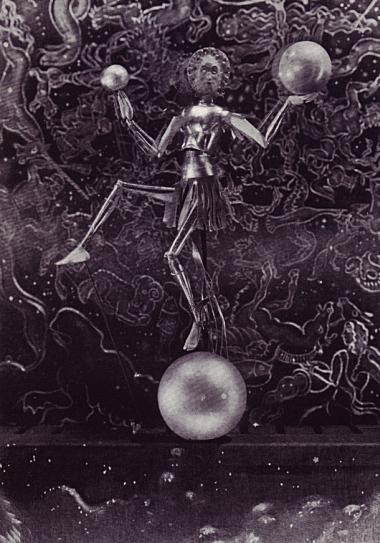
Master of Puppet Master
Richard Teschner
1879 - 1948
50 Watts
_______________________
The Madness of the Day
Maurice Blanchot
trans. Lydia Davis
scribd
I am not learned; I am not ignorant. I have known joys. That is saying too little: I am alive, and this life gives me the greatest pleasure. And what about death? When I die (perhaps any minute now), I will feel immense pleasure. I am not talking about the foretaste of death, which is stale and often disagreeable. Suffering dulls the senses. But this is the remarkable truth, and I am sure of it: I experience boundless pleasure in living, and I will take boundless satisfaction in dying.
I have wandered: I have gone from place to place. I have stayed in one place, lived in a single room. I have been poor, then richer, then poorer than many people. As a child I had great passions, and everything I wanted was given to me. My childhood has disappeared, my youth his behind me. It doesn't matter. I am happy about what has been. I am pleased by what is, and what is to come suits me well enough.
Is my life better than other peoples lives? Perhaps. I have a roof over my head and many do not. I do not have leprosy, I am not blind, I see the world—what extraordinary happiness! I see this day, and outside it there is nothing. Who could take that away from me? And when this day fades, I will fade along with it—a thought, a certainty, that enraptures me.
I have loved people. I have lost them. I went mad when that blow struck me, because it is hell. But there was no witness to my madness, my frenzy was not evident: only my innermost being was mad. Sometimes I became enraged. People would say to me, Why are you so calm? But I was scorched from head to foot; at night I would run through the streets and howl; during the day I would work calmly.
(....)I had to acknowledge that I was not capable of forming a story out of these events. I
had lost the sense of the story; that happens in a good many illnesses. But this
explanation only made them more insistent. Then I noticed for the first time that
there were two of them and that this distortion of the traditional method, even
though it was explained by the fact that one of them was an eye doctor, the other a
specialist in mental illness, constantly gave our conversation the character of an
authoritarian interrogation, overseen and controlled by a strict set of rules. Of course
neither of them was the chief of police. But because there were two of them, there
were three, and this third remained firmly convinced, I am sure, that a writer, a man
who speaks and who reasons with distinction, is always capable of recounting the
facts that he remembers.
A story? No. No stories, never again
.....................................................
Lévinas on the Madness of the Day
Despite the apparent heterogeneity of its themes, the arrangement or juxtaposition of which would be worthy of special analysis, and apart from its own rhythms and musical effect, the Madness of the Day has, as it were, an optical focus. It is its title itself: Madness of the Day. Madness of today, but madness of the day also in the sense that, in it, day is madly desired, and in the sense that day - clarity and measure - goes mad there, and, hence, especially, in the sense that the madness of day is contrasted with the madness or panic of night - with the "dread of the night" of the Song of Songs (3:8), which envelops King Solomon, the prince of peace, despite his splendor.
(....)
What is at stake in this narrative, despite appearances, is not an allusion to finitude - a widespread theme during that period of the great ascendancy and fashion of the philosophy of existence; though Blanchot (as we know from other indications) was able to intuit, beyond the widely known Existentialist tenets, the thought then unknown in France and even in Germany of what may be called "the last Heidegger". The Madness of the Day might therefore be said to be free from any temporal limitations in the current sense of the term, were it not for the fact that unfreedom (but an unfreedom less free than any determinism and any tragedy - a hellish unfreedom) is the intent of this text, as it runs through Blanchot's entire oevre in a manner that is both renewal and repetition. ... At the heart of the time that passes, nothing goes on, nothing comes up. All is always memory and threat. The flow of instants snags on transitions that spin around on themselves, recommence the Same. Iteration of a tale telling the tale itself. ... A movement maintained in a maintenance that, in a human Self, is suffocation in self. The madness of the now, madness of the day. The madness of Auschwitz, which does not succeed in passing. In the structure of the present - the actual, the Today - like this? The infernal. The infernal that shows itself in Auschwitz, but that lies hidden in the temporality of time, maintaining it.
Proper namesEmmanuel Lévinas
translated by Michael B. Smith google books
_______________________
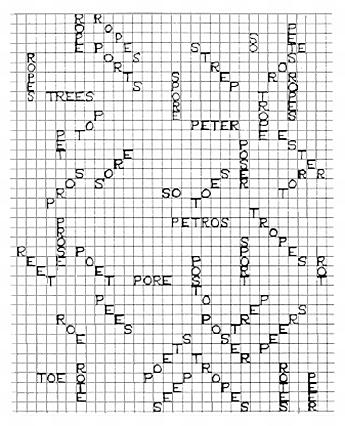 Vocabulary Gatha
for Pete Rose
Jackson Mac Low
Notation And The Art Of Reading
Karl Young
published in Open Letter s.4, no. 7, Spring, 1984. Coach House Press
commissioned by bpNichol
The idea of notation implies, if not demands, performance. Virtually any form of writing is a kind of notation and any form of reading is a type of performance. Poetry is an intensely physical art, one that activates several senses at once. In aural societies poetry has traditionally been accompanied by facial movement, gesture, manipulation of symbolic objects, the drawing and painting of figures, the wearing of costumes, etc. -- all of which, in a tribal context, are read. Poetry still is a physical art using multiple senses: the body as a whole equals or sometimes replaces the voice in performance art, and even silent readers turn pages, move their heads, their eyes, the roots of their tongues if not their tongues and lips, and so forth.
The kinesthetic link between sight, sound, and speech is mirrored by an inner speech, inner sight, and inner sound. Our thoughts are a combination of inner sight and inner speech. With this inner kinesthesia, we name things as we see them and form images of things about which we hear. Poetry, whether it is heard or seen, stimulates these inner sensations. An Anglo-Saxon warrior listening to a performance of Beowulf in the near darkness of a meadhall would not only be able to see dragons in the flickering coals of the fire, his mind would be filled with images generated by the words he heard. In like manner, a contemporary reader reading silently (provided she or he hasn't been hampered by speedreading practices) will hear an inner voice, which may call up inner sight. A great deal has been written about the "image" in poetry throughout this century. When that term is used it seldom refers to anything that can be seen on the page, but rather the inner vision of the reader.
In the mainstream culture of the western world in the twentieth century, reading becomes an ever more ephemeral, dephysicalized act. At the same time contemporary poets work against this tendency, rediscovering reading methods from other cultures and discovering new ones on their own. Though for most people reading becomes more and more a system of simple data transference, poets attempt to find alternative notations and to expand the range of their performance. In this essay I will give examples of how poetry was read in three cultural contexts removed from ours in culture and time, and then describe some forms of notation in contemporary poetry and how they can be read. ...(more)
_______________________
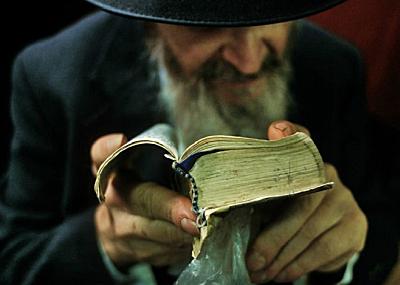
Carolyn Drake
_______________________
Theory is dead, and long live theory. The designated mourners have tenure, anyway, so they’ll be around a bit. As for the rest of us, an opening has emerged, in the novel and in intellect. What to do with it?
Death Is Not the End
Long Live Theory!
The Editors n+1
Was theory a gigantic hoax? On the contrary. It was the only salvation, for a twenty year period, from two colossal abdications by American thinkers and writers. From about 1975 to 1995, through a historical accident, a lot of American thinking and mental living got done by people who were French, and by young Americans who followed the French.
(....)
They weren’t wrong, the positivists—you didn’t have to get very far into academic Idealism to see it was so much soft-boiled egg. The tragedy of analytic philosophy was the fact that it won so decisively in US philosophy departments—annihilating its traditionalist competition—at just the wrong time. It triumphed in the Sixties, when the actual convulsions of US society called for a renewed treatment of love, freedom, the other, politics, and history—“pseudo-problems” turned intensely real. It was nice to have John Searle so understanding of SDS at Berkeley, and Hilary Putnam chanting Maoist slogans at Harvard; but the kids in Paris had Foucault.
(....)
Theory is only something that could “die” in the last five years because it was an import from a country, France, that had discontinued the model, while the most visible American inheritors were exegetes and epigones, translators and disciples—therefore mediocre. Theory’s death was also literal. Hardly any of the old heroes are alive. The exceptions are Baudrillard (alive, but cynical), Habermas (old and healthy, but German), and, incredibly, Claude Lévi-Strauss. Might Althusser be alive, imprisoned? No, dead. Pan-European successor candidates, the likes of ˇi˛ek, Badiou, Ferry, Virillio, Agamben, Negri, Vattimo, Sloterdijk, Luhmann, Kittler, seem somehow, well, small by comparison. Optical illusion? No, they really are smaller. Or up to something different....(more)
_______________________
Philosophy in Review
Vol 31, No 3 (2011)
_______________________
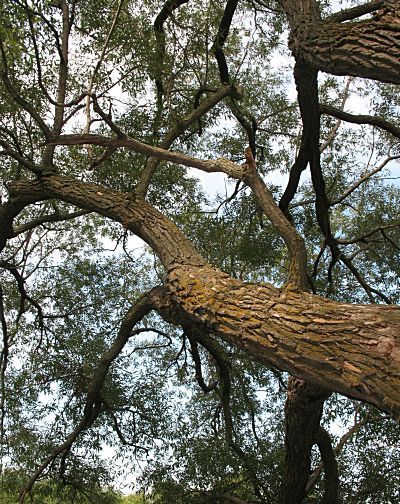
photo - mw
_______________________
Jerry’s Rattle
Robert Kelly
wakes the dead.
It quacks.
I translate rocks
he said, I say pebbles,
I know ground
I know leather things
because they say.
When the eagle comes by itself
let it settle or fly off
who know what it carries in its beak
my business is to watch
watch with my rattle
watch with my mouth
with the rattle of my rattle I see everything
(....)
My teachers said
Fly on your shadow only
leave the machines alone
fly on your shadow
it will never fall.
(....)
when I was little boy
the radio used to say every week
only the shadow knows
only a shadow is always at home
the sun thinking its way through the clouds
makes it happen
the firelight makes it happen
we invented fire
so we could have shadows at night
the sun is a rattle that sings shadows
I belong to everything when I make noise.
...(more)
followed by
Variations On A Round Of Rattles
for Robert Kelly
Jerome Rothenberg
_______________________
Looting with the lights on
Naomi Klein
Britain’s Riots: Thuggery, Looting, Lawlessness… By the Ruling Class
Finian Cunningham
Global Research
The fact that the capitalist economic system is in worldwide meltdown is not even registered in the mainstream commentary...
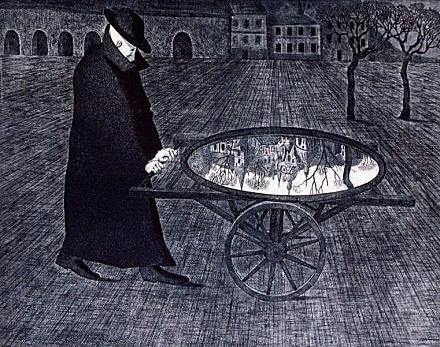
The Window
Jindrich Pilecek
1972
_______________________
Towards a conceptual lyric
From content to context
Marjorie Perloff
jacket2
What, then, will “go” in verse? When Pound used the term he was referring neither to metrical nor to free verse (“vers libre has become as prolix and as verbose as any of the flaccid varieties that preceded it”) but to the musical phrase: “As regarding rhythm: to compose in the sequence of the musical phrase, not in sequence of a metronome”. And again: “To break the pentameter, that was the first heave.” The musical phrase is, of course, associated with lyric: for the ancient Greeks, the term lyric referred to verse that was accompanied by a lyre or other stringed instrument (for example, the barbitos), and musical speech — speech to be sounded — characterized a large body of poetry from the Hebrew and the Chinese to the Arabic lyric of the Middle Ages and Troubadour verse of the twelfth and thirteenth centuries.
When lyric is construed, as it has been since the Romantics, as the art of self-expression, of the private language of a subject overheard while engaged in meditation or intimate conversation with another, conceptualism would seem to be, by definition, its enemy, relying, as it so often does, on words not one’s own or submitting ordinary words to elaborate rules. But if we relate lyric to the musical phrase, the dichotomy disappears: what Dworkin describes as “sorting and selecting from files of accumulated language” is perfectly consonant with the notion of a poem as a distinctively sounded structure, the proviso being that in the digital age the look of the text becomes equally important, so that all poetry is, in a sense, visual as well as sound poetry. In Joyce’s idiom, taken over by the Concrete poets, who anticipated some central strains of conceptualism, poetry is verbivocovisual....(more)
_______________________
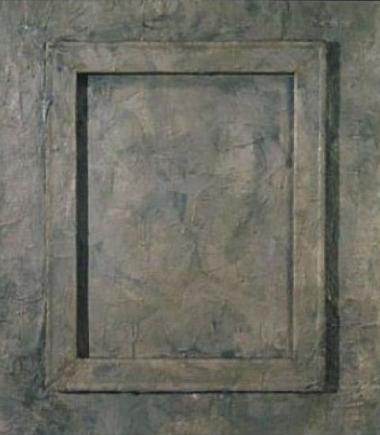
penguin books cover
Agape! Agape!
William Gaddis
2002
ifile pdf
No but you see I've got to explain all this because I don't, we don't know how much time there is left and I have to work on the, to finish this work of mine while I, why I've brought in this whole pile of books notes pages clippings and God knows what, get it all sorted and organized when I get this property divided up and the business and worries that go with it while they keep me here to be cut up and scraped and stapled and cut up again my damn leg look at it, layered with staples like that old suit of Japanese armour in the dining hall feel like I'm being dismantled piece by piece, houses, cottages, stables orchards and all the damn decisions and distractions I've got the papers land surveys deeds and all of it right in this heap somewhere, get it cleared up and settled before everything collapses and it's all swallowed up by lawyers and taxes like everything else because that's what it's about, that's what my work is about, the collapse of everything, of meaning, of language, of values, of art, disorder and dislocation wherever you look, entropy drowning everything in sight, entertainment and technology and every four year old with a computer, everybody his own artist where the whole thing came from, the binary system and the computer where technology came from in the first place, you see? I can't even go into it, you see that's what I have to go into before all my work is misunderstood and distorted and, and turned into a cartoon because it is a cartoon, whole stupefied mob out there waiting to be entertained, turning the creative artist into a performer, into a celebrity like Byron, the man in the place of his work when probability came in and threw that whole safe predictable Newtonian world into chaos, into disorder wherever you turn, discontinuity, disparity, difference, discord, contradiction, what they're calling aporia they took from the Greeks, the academics took the word from the Greeks for this swamp of ambiguity, paradox, perversity, opacity, obscurity, anarchy the clock without the clockmaker and the desperate comedy of Kierkegaard's insane Knight of Belief and even Pascal's famous wager in a world where everyone is "so necessarily mad that not to be mad would amount to another form of madness" where the artist is today, the artist the real artist Plato warned us about, the threat to society and the, read Huizinga on Plato and music and the artist as dangerous and art as dangerous and music in this mode and that mode, the Phrygian mode to quiet you down and the tenor and bass Lydian to make you sad and the soft and drinking harmonies, the Lydian and the Ionian where the art the, the artist having trouble breathing here I, coming out of the anaesthesia down in the recovery room tried to raise my leg and it suddenly jumped up by itself like a, like the pain avoiding pain that's what all this is about isn't it?...(more)
The Secret History of Agape- AgapeSteven Moore
_______________________
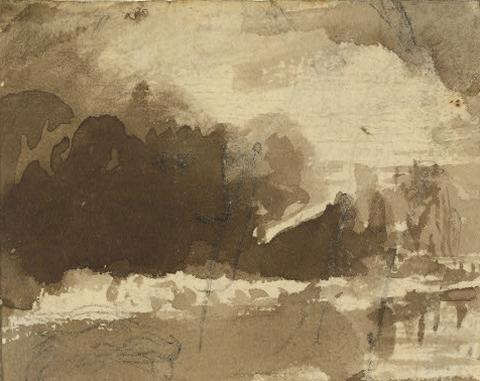 Landscape Composition
John Varley
b. August 27, 1778
_______________________
Fencing Off Ideas: Enclosure and the
Disappearance of the Public Domain
James Boyle
The law locks up the man or woman
Who steals the goose from off the common
But leaves the greater villain loose
Who steals the common from off the goose.
The law demands that we atone
When we take things we do not own
But leaves the lords and ladies fine
Who take things that are yours and mine.
The poor and wretched don't escape
If they conspire the law to break;
This must be so but they endure
Those who conspire to make the law.
The law locks up the man or woman
Who steals the goose from off the common
And geese will still a common lack
Till they go and steal it back.
(....)
The poem manages in a few lines to criticize double standards, expose the artificial and controversial nature of property rights, and take a slap at the legitimacy of state power. And it does it all with humor, without jargon, and in rhyming couplets.
Sir Thomas More went further, though he used sheep rather than geese to make his point. He argued that enclosure was not merely unjust in itself, but harmful in its consequences. It was a curse of economic inequality, crime, and social dislocation.
Your sheep that were wont to be so meek and tame, and so small eaters, now, as I hear say, be become so great devourers and so wild, that they eat up, and swaIlow down the very men themselves. They consume, destroy, and devour whole fields, houses, and cities. For look in what parts of the realm doth grow the finest and therefore dearest wool, there noblemen and gentlemen.. . leave no ground for tillage, they enclose all into pastures; they throw down houses ; they pluck down towns, and leave nothing standing, but onIy the church to be made a sheep-house. . . .Therefore that one covetous and insatiable cormorant and very plague of his native country may compass about and enclose many thousand acres of ground together within one pale or hedge, the husbandmen be thrust out of their own.
The enclosure movement continues to draw our attention. It offers irresistible ironies about the two-edged sword of "respect for property" and lessons about the role of the state in making controversial, policy-laden decisions to define property rights in ways that subsequently come to seem both natural and neutral....(more)
_______________________
In a simplistic analysis, a feral elite has bred a “feral” urban mob in a classic, centuries-old repetition of patterns of social discontent, bubbling to the surface in a sudden expression of blind undirected rage. The young, the jobless and the marginal, in particular, sense at least their displacement and invisibility. This accompanies the final clashing of all the fresh expectations of the Blair years. Amidst urban blight, torpor and a cultural disintegration, largely ignored by a web of introverted ruling circles, the inevitable has finally happened. However a-political the response on the streets, a cynical and demonstrably corrupt governing class–whilst pursuing pointless and costly enterprises abroad–has finally had a dose of the reality it had long created but ignored. Surrounded by a consumerist media, and the material lust of a publicized minority, mass looting is a depressingly predictable and materialist reaction.
-
Nigel Young
_______________________
The Wolves at the Door - Autumn 2011
An irregular journal of anarchist ideas and theory.
Sydney, Australia.
Anarchists Lost in Space
The relationship between social movements and anarchist spaces.
Cake or Death
On the gap between how we talk about politics with each other and how we talk to other people.
Signs of the Defeat of the Libyan Revolution
A Libyan anarchist against Western intervention.
An interview with the Mutiny zine collective
Some hard questions for the editors of another local anarcho-publication.
Sectarianism and Solidarity
A review of Anarchist Summer School.
From the Streets of Athens
Two statements responding to recent events in Greece.
Untangling the Knots
To identify and expel liberal ideology from revolutionary practice.
ZineLibrary
_______________________
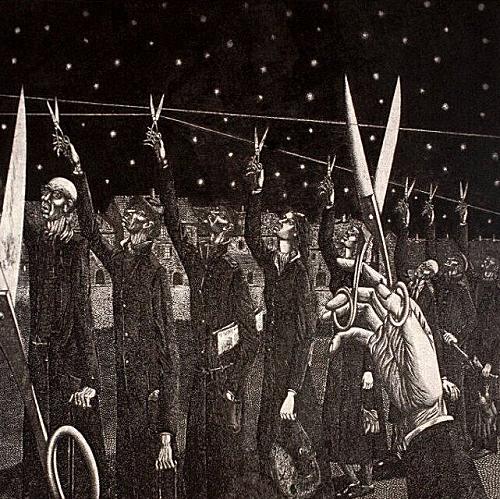
Scissors
Jindrich Pilecek
1998
_______________________
Primitive, The Critical Term
Stanley Diamond
Jerome Rothenberg
Primitive is, I believe, the critical term in anthropology, the word around which the field revolves, yet it remains elusive, connoting, but never quite denoting, a series of related social, political, economic, psychological, and psychiatric meanings. That is, primitive implies a certain level of history, and a certain mode of cultural being, which, in this paper, I shall make a further attempt to formulate.
This mode of cultural being is continuously obliterated or attenuated by the processes of civilization, and more radically so than we are usually able or willing to acknowledge; as a result, the image of an identifiable, cross-cultural, pre-civilized, and, yes, a priori human nature has practically disappeared from our conceptual lexicon. Unyielding cultural relativism, cultural determinism and social scientism are, in part, and each in its own way, rationalizations of a civilization that has forgotten what questions to ask of itself. These attitudes have helped blunt the sense of universal human need, conflict and fulfillment which has been most adequately expressed, in the past, through art and religion. It is, I believe, a singular task of anthropology, no matter what its practitioners call themselves, to assist in the reformulation of pertinent life-preserving questions....(more)
as reprinted in Alcheringa
Alcheringa Archive:
A Journal of Ethnopoetics, 1970-1980
complete with mp3s of original disk inserts

lock and blacksmith's shop
Jones Falls
Rideau Canal
photo - mw
_______________________
Fillip
Issue 13 / Spring 2011
a publication of art, culture, and ideas released three times a year by the Projectile Publishing Society from Vancouver, British Columbia.
The Golden Potlatch: Study in Mimesis and Capitalist Desire
Candice Hopkins
Browsing the AAAARG Library
Jeff Khonsary
(....)In daily use, the AAAARG Web site serves an academic community lacking a physical structure or institutional affiliation. It bridges the interests of many different types of users who mobilize the site because they lack the funds, ability, or energy to access the same material elsewhere. This community coalesces around both the electronic discussions that fuel the development of and research with the archive and, importantly, the activities of other non-institutional institutions such as the Public School, a global “school with no curriculum” co-founded by Sean Dockray, one of AAAARG’s initial architects. For the Public School, AAAARG serves as an off-off-campus library and digital textbook distribution point, facilitating student access to course readings through a semi-structured (and semi-chaotic) collection of bibliographies, called “issues,” on the site. ...(more) aaaaarg
free registration req.
where you can find links to, e.g. Pound's Cantos
Hugh Kenner's The Pound Era
_______________________
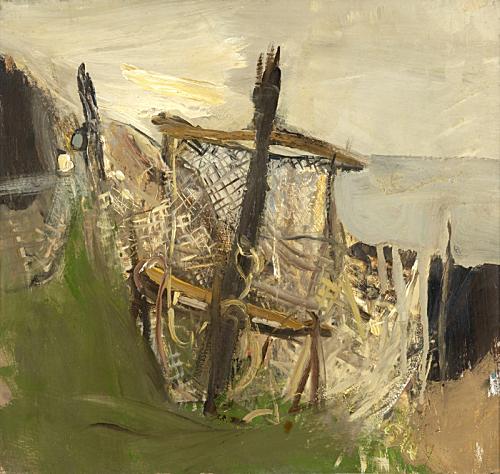
Fishing Nets
1963
Joan Eardley
d. August 16, 1963
_______________________
When Self Became Art And Buttons Became Tender
Haider Shahbaz
3quarksdaily
(....)
Today, it is impossible to write without thinking or considering the inadequacy of language, the conflict between the internal and the external and most of all, without taking a long engrossing bath in your own self. However, this exercise is all the more precarious today because of modernity’s lessons itself. It is the teachings of Nietzsche, Marx and Freud – three of modernity’s favourite sons – who rendered the quest for the self impossible. The problems of the subconscious, of communication, and of materialism and culture, expressed in these three have put the self out of any mortal’s reach. As Stein herself acknowledged, “the human being essentially is not paintable”. But this has only increased the obsession with consciousness and the self. The gnawing sad interiority of the west is plastered all over its literature: from the psychology of Anna Karenina, to Faulkner’s declaration that “the problems of the human heart in conflict with itself which alone can make good writing because only that is worth writing about, worth the agony and the sweat”, to the New Vision of the Beats (“art is merely and ultimately self-expressive”), to Lįszló Krasznahorkai’s “reality examined to the point of madness”. The west is continuously chasing its own tail, on the verge of a discovery that will never come. But maybe this tail chasing is essential. It is important to value the utterly elusive self, and chase it. Perhaps, today more than ever, we need to understand and accept the aesthetics and ethics of meaninglessness, of the absence of the categorical imperative from the self, to see the self as vast and incomprehensible as it is, to see buttons as tender. What if all the meaning was hidden in sheer meaninglessness? What if understanding the meaninglessness of the self was the beginning of meaning in the self? As Kafka said, “The Messiah will come only when he is no longer necessary; he will come only on the day after his arrival; he will come, not on the last day, but on the very last day.”...(more)
_______________________

Fred Wah
Photo from
Between: Living in the Hyphen
Directed by Anne Marie Nakagawa
National Film Board
Music At The Heart Of Thinking Ninety-Four
Fred Wah
This is no mass synapse I'm after and I've known awhile now being lost is as simple as sitting on a log but the fumble jerked mystique clouds grabbing as the staked mistake or stacked and treasured garbage belongs familiar to a gardened world disturbed as heat
O soft anxiousness to be found again and again estranged but marvellous then enlived slope of scree and marmot whistle so that synchronous foreignicity rages in music I want to put into a region of the cadence before falling's recognized you know
where there's that disgraceful ensoulment Mao called swimming.
"Loose Change": The Fred Wah Digital Archive
Fred Wah at PennSound and EPC
Fred Wah, "Race, to go"
On the other side of the tracks (PoemTalk #44)
Lisa Robertson, Jeff Derksen, Bob Perelman and Al Filreis
_______________________
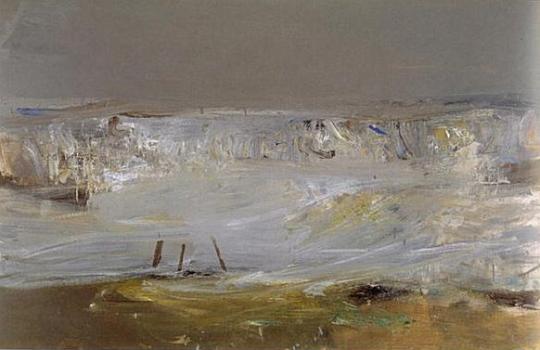
Early Flood Tide
Joan Eardley
_______________________
Chicago Poem
Lew Welch
(....)
Standing in the boat one night I watched the lake go absolutely
flat. Smaller than raindrops, and only
Here and there, the feeding rings of fish were visible a hundred yards
away – and the Blue Gill caught that afternoon
Lifted from its northern lake like a tropical! Jewel at its ear
Belly gold so bright you'd swear he had a
Light in there. His color faded with his life. A small
green fish . . .
All things considered, it's a gentle and undemanding
planet, even here. Far gentler
Here than any of a dozen other places. The trouble is
always and only with what we build on top of it.
There's nobody else to blame. You can't fix it and you
can't make it go away. It does no good appealing
To some ill-invented Thunderer
Brooding above some unimaginable crag . . .
It's ours. Right down to the last small hinge it
all depends for its existence
Only and utterly upon our sufferance.
Driving back I saw Chicago rising in its gases and I
knew again that never will the
Man be made to stand against this pitiless, unparalleled
monstrocity. It
Snuffles on the beach of its Great Lake like a
blind, red, rhinoceros.
It's already running us down.
...(more)
_______________________
Planet of Slums, Age of Riots
George Ciccariello-Maher
When economic violence reaches a certain point, social counter-violence soon follows, and yet it is rarely the bankers or the politicians, the purveyors of global austerity measures, who bear the brunt. It begins with name-calling, and no name has more political and historical resonance than “the mob,” the most traditional of slurs. From Philadelphia to London, we are told, the specter of the mob looms, and to the image of the “baying mob,” that keystone of journalistic integrity The Sun has also added the image of the “trouble-making rabble.”
Irrational, uncontrollable, impermeable to logic and unpredictable in its movements, these undesirables have once again ruined the party for everyone, as they have done from Paris 1789 to Caracas 1989. In Fanon’s inimitable words: “the masses, without waiting for the chairs to be placed around the negotiating table, take matters into their own hands and start burning…”
To use the word “mob” is a fundamentally political gesture. It is an effort by governing elites and conservative forces to delegitimize and denigrate popular resistance, to empty it of all political content by drawing a line of rationality in the sand. To make demands is reasonable, but since “the mob” is the embodiment of unreason, it cannot possibly make demands. Never mind the very clearly political motivations that sparked the rebellions around London, as well as the growing and equally political concerns about economic inequality and racist policing: these have been well documented, no matter how little many Britons want to hear it.
But I want to address directly the idea that the riots are fundamentally irrational, as the smear of “the mob” would symbolically insist. Let’s listen closely, let’s block out the torrent of media denunciation and hear what the rebels are saying themselves:...(more)
_______________________
The new "Let them eat cake!"
10 shocking, illuminating moments that prove just how out of touch the powerful really are
David Sirota
_______________________
Something has snapped, and it has been a long time coming
Owen Hatherley
verso
(....)
Someone commenting on James Meek's great London Review of Books article on parallel Hackneys mentioned China Miéville's recent science fiction novel The City and The City, where two cities literally do occupy the same space, with all inhabitants acting as if they don't. Miéville set it in Eastern Europe, but the inspiration is surely London.
All of us, all along—if we're honest for a microsecond—knew this was a ludicrous way to build a city, to live in a city.(....)
Occasionally, during the 12 years I've lived in the city, I'd often idly wonder when the riots would come: when the situation of organic delis next to pound shops, of crumbling maisonettes next to furiously speculated-on Victoriana, of artists shipped into architect-designed Brutalist towers to make them safe for Regeneration, of endless boosterist self-congratulation, would finally collapse in on itself. Like most thoughts of this sort, it stayed in the back of the mind, and I'd almost forgotten about it when it finally happened.
(....)
The right will not waste the opportunity to treat this as a meaningless outbreak of thuggery, needing the smack of firm government, but that doesn't mean we should do the same. Over the last few years, the ruling class has kept trying to commit suicide—financial crisis, expenses scandal, News International, the Met, financial crisis mark two—and most of us won't let them. We'd rather Keep Calm and Carry On. These kids, venal and stupid as some of their actions obviously are, don't want to carry on. They want to see the whole bloody thing burn....(more)
_______________________
The Basic Con
Lew Welch
b. August 16, 1926
Those who can't find anything to live for,
always invent something to die for.
Then they want the rest of us to
die for it, too.
These, and an elite army of thousands,
who do nobody any good at all, but do
great harm to some,
have always collected vast sums from all.
Finally, all this machinery
tries to kill us,
because we won't die for it, too.
|

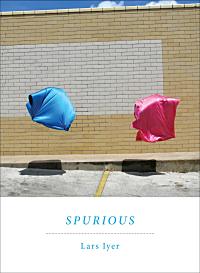


 The Age of Briggs & Stratton
The Age of Briggs & Stratton



















































